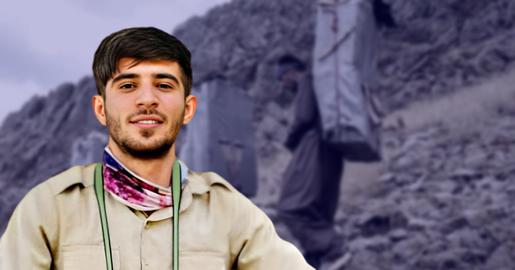Iranwire – As the noon sun beat down on the cemetery of Mirdeh, a village in Iran’s Kurdistan province, mourners gathered to pay their respects to Ahoan Dashti, a 28-year-old transborder porter, or kolbar, who was shot dead by border forces.

When the ambulance carrying Dashti’s body arrived from the city of Baneh, the anguished cries of Dashti’s father, Atta, echoed through the cemetery, while his mother and sisters’ sobs tugged at the strings of the mourners’ heart.
The sorrowful procession carried the casket to Dashti’s final resting place, accompanied by the murmurs of the mourners who had come from the surrounding villages and the districts of Saqqez and Baneh.
Activists say Dashti was shot without warning near the Hengezhal border crossing earlier on December 5, in yet another unlawful shooting of an unarmed Kurdish kulbar who worked under cruel and inhumane conditions to make a living.
His father operated a brick-making workshop in Mirdeh, with his son lending him a helping hand, but a year ago, the rising cost of materials forced the family to close the business and migrate to Baneh.
The father took up day labor jobs, while his son became a kolbar to provide for his family.
“The goods we were carrying were considered contraband by the Islamic Republic and border guards, which prevented us from using the designated routes,” a friend of the young man recounts. “Instead, we ventured through untamed paths, a decision that proved fatal.”
Despite his small stature, Dashti was known for his speed and agility in carrying heavy loads.
His jovial nature and the camera he always carried around his neck made him the group’s de facto guide.
On the fateful day of Dashti’s demise, he and his companions were ambushed before dawn.
The barbed wire entanglements laid by border guards across the path hindered their escape from border guards.
Dashti’s story is a stark reminder of the plight of countless kolbars who risk their lives hauling goods on their backs across the borders of Iran and over long distances, mostly in the impoverished, mountainous Kurdish areas adjacent to Iraq.
The Iranian authorities label kolbars as “smugglers,” but human rights organizations maintain that their activity is a form of survival for many men living in impoverished border regions where economic opportunities are scarce.
The government tries to regulate smuggling by creating designated routes for kolbar.
Only villagers living within a 20-kilometer radius of the recently opened Hengezhal crossing are authorized to transport goods through the border point.
The other kolbars are forced to navigate dangerous paths.
From 2012 to the end of 2021, at least 547 kolbars died and more than 1,601 were injured in Kermanshah, West Azerbaijan and Kurdistan provinces, according to the Kolbar News website.
 Shabtabnews In this dark night, I have lost my way – Arise from a corner, oh you the star of guidance.
Shabtabnews In this dark night, I have lost my way – Arise from a corner, oh you the star of guidance.



